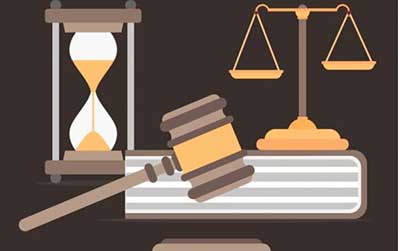Relevance: GS-2: Separation of powers between various organs dispute redressal mechanisms and institutions, Parliament and State Legislatures - structure, functioning, conduct of business, powers & privileges and issues arising out of these.
Key Phrases: Constitutional void, Participative democracy, Rule of law, Constitutionalism, Privilege of House, Graded approach, Democratic Principles, Judicial review, Disciplinary measures, Punitive actions.
Why in News?
- Recently, Supreme Court declared as grossly illegal and irrational the suspension of 12 BJP legislators for one year by the Maharashtra Assembly for disorderly conduct. Brushing aside objections that the judiciary should not examine the validity of the proceedings of the House, a three judge Bench ruled that the suspension beyond the term of the particular session in which it was imposed was a nullity in the eyes of the law.
What are the rules on the length of suspension of a Member of Parliament?
- Rules 373, 374, and 374A of the Rules of Procedure and Conduct of
Business in Lok Sabha provide for the withdrawal of a member whose
conduct is “grossly disorderly”, and suspension of one who abuses the
rules of the House or willfully obstructs its business.
- The maximum suspension as per these Rules is “for five consecutive sittings or the remainder of the session, whichever is less”.
- The maximum suspension for Rajya Sabha under Rules 255 and 256
also does not exceed the remainder of the session.
- Similar Rules also are in place for state legislative assemblies and councils which prescribe a maximum suspension not exceeding the remainder of the session.
Powers to State Legislative Assembly -
- Rule 53 of the Maharashtra Assembly Rules, the Speaker could direct a Member to withdraw from the Assembly for disorderly conduct for the day, or the remainder of the Session. However, there is no such limitation when the whole House decides to impose suspension.
- Article 194 on the powers and privileges of the House, that any member who transgresses parliamentary privileges can be suspended through the inherent powers of the House.
- The Government also pointed out that in the Raja Ram Pal case (2007), the Supreme Court had upheld the expulsion of 12 MP’s in the cash for questions scandal. When expulsion, the greater punishment was allowed, then suspension, being a lesser penalty, cannot be questioned.
- Article 212 - The courts do not have jurisdiction to inquire into
the proceedings of the legislature.
- Article 212 (1) states that “The validity of any proceedings in the Legislature of a State shall not be called in question on the ground of any alleged irregularity of procedure”.
Supreme Court observations -
The Supreme Court has observed that the suspension of 12 BJP MLAs from the Maharashtra Assembly for a full year is prima facie unconstitutional, and “worse than expulsion”. A “constitutional void” and a “hiatus situation” has been created in these constituencies, and the “consequences are dreadful”, the court said.
Reasons behind the Supreme Court ruling -
- The Bench noted that Rule 53 showed a ‘graded approach’ to
the issue of disorderly behaviour, an initial suspension for a day, and then
for the remainder of the session, but nothing beyond it. Once the length of
the suspension went beyond the session,it ceased to be a disciplinary
measure, but partook in the character of a punitive action.
- Citing Privy Council cases and Indian precedents, the Bench said anything that went beyond the session was irrational and grossly illegal.
- Under Section 151 (A) of The Representation of the People Act, 1951,
“a bye-election for filling any vacancy… [in the House] shall be held
within a period of six months from the date of the occurrence of the
vacancy”. This means that barring exceptions specified under this section,
no constituency can remain without a representative for more than six
months.
- Court ruled that a one year suspension meant that the constituency concerned would go without representation in the Assembly for a whole year.
- Conflict with Article 190 - Bench had raised a question as to how any suspension can go beyond 60 days, in the light of Article 190(4) of the Constitution, which says the House could declare a seat vacant if a member is absent for 60 days.
- Against democratic principle - The Supreme Court said that the one-year suspension was prima facie unconstitutional as it went beyond the six-month limit, and amounted to “not punishing the member but punishing the constituency as a whole”.
What general principles arise from the case?
- Due Process of law should be followed - The court has reiterated the principle that even though the judicature will not interfere in the functioning of the legislature, a coordinate body, it is not deprived of the power of judicial review if there is a violation of the Constitution.
- Upholding Constitutionalism - Even though there were no prescribed limits to the privileges of the House, there is no doubt that these are subject to the provisions of the Constitution.
- Participative democracy is the soul of the legislature - A lengthy suspension, apart from the deprivation of representation for the constituents, may also be detrimental to democracy, as it could be used to manipulate numbers in the legislature, and deny the opposition the opportunity to participate effectively in debates.
The Supreme Court is expected to rule on the question of whether the judiciary can intervene in the proceedings of the House. Constitutional experts, however, say that the court has clarified in previous rulings that the judiciary can intervene in case of an unconstitutional act done by the House.
Source: The Hindu, Indian Express
Mains Question:
Q. What are parliamentary privileges enjoyed by our representatives? What are their sources and is there any limitation on them?









